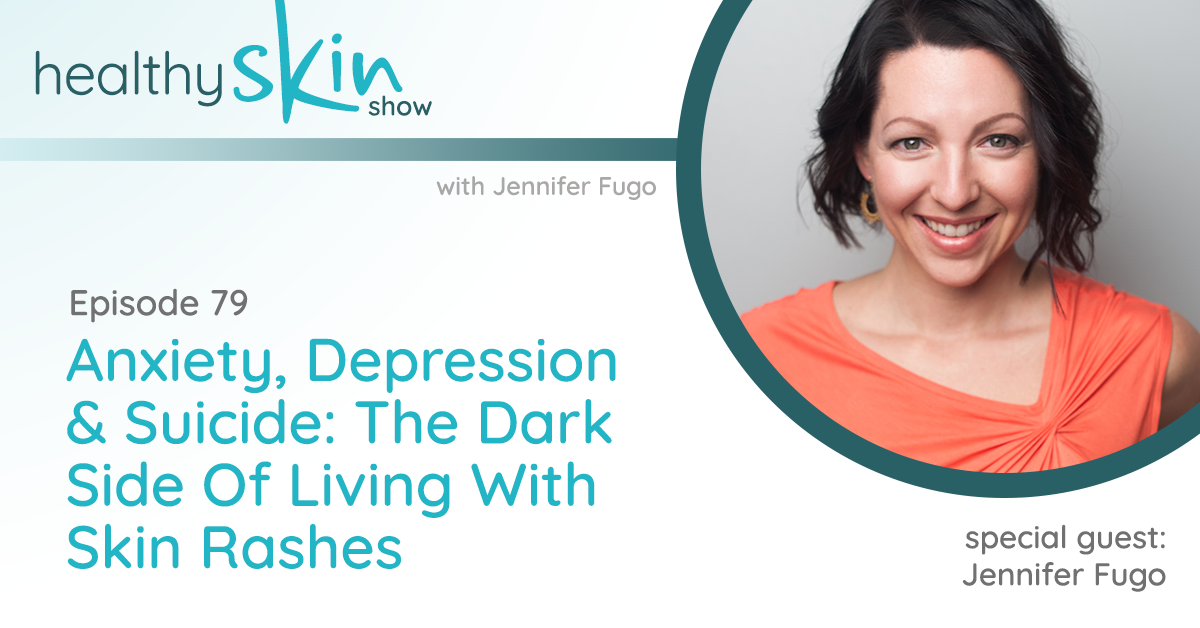
**TRIGGER WARNING** Suicide
While there can certainly be blessings on your health journey, there’s also a dark side. It’s not uncommon to hear people with eczema, psoriasis and other skin rash conditions share of about their anxiety, depression and even thoughts of suicide.
It’s important that we take an honest look at the emotional and mental toll that skin rashes can take on someone.
The hope is that we can create awareness and help those who feel as if they are drowning in their toughest moments.
In this episode, I’m sharing the stats that I’ve uncovered that are heartbreaking. It’s my hope that by acknowledging what’s happening, we can do better and demand better care.
I’d love to hear your thoughts below in the comments section.
Or, listen on your favorite app: iTunes (Apple Podcasts) | Spotify | Stitcher | TuneIn | Subscribe on Android
In this episode:
- Negative emotions that often come up for people living with skin rashes
- It’s more common than you think to deal with daily anxiety, depression and even suicidal thoughts
- Surprising stats that we should be talking about (but aren’t)
- Why negative emotions don’t necessarily just stop or go away as your rashes disappear
- Most shocking stat about eczema sufferers who commit suicide
- What’s the best way to reach out for help (and who should you talk to)
Quotes:
In a JAMA dermatology study…eczema sufferers were 44% more likely to have suicidal thoughts and they were 36% more likely to attempt suicide compared with those who did not have the disease.
One of the most disturbing things that I discovered looking into this research is that “two-thirds of patients with eczema who died from suicide had visited a physician in the month before their death.”

Anxiety, Depression & Suicide: The Dark Side Of Living With Skin Rashes (FULL TRANSCRIPT)
Welcome to Episode #79 of the Healthy Skin Show!
In today’s episode, I want to talk about the emotional impact that skin rashes can leave on your life.
No matter what type of rashes you have…
No matter your diagnosis…
It’s often considered to cause a negative impact on your life. And unfortunately, it can be difficult at times to pull yourself out of feeling like your skin has become a huge wrecking ball.
Today’s conversation was inspired by World Mental Health Week.
It’s very important to me because I don't often hear what I’m going to talk about being shared much at all.
I totally get it… people want to focus on the positivity of living with skin rashes. They focus on showing your skin and loving yourself, both of which are equally important.
Yet there are times where you might feel like you're not allowed to be honest about the negative, dark feelings that you experience that are incredibly uncomfortable.
One of my goals here at the Healthy Skin Show is not just to focus on alternative ways to address your skin. The physical aspect of living with skin rashes is only one facet of the conversation.
I also didn't want to only flood you with stories of inspirational triumph that for some may feel incredibly unattainable.
While I do love to share positive and uplifting stories, there tend to be fewer of them out there compared to the days that you might feel are a struggle to get through.
Between my own experience living with skin rashes and talking with many of you — listeners, readers of my newsletter and private clients — we must make space to acknowledge the flipside.
Especially since feelings of loneliness, shame, embarrassment, isolation, anger, fear and even rage can become incredibly routine and common.
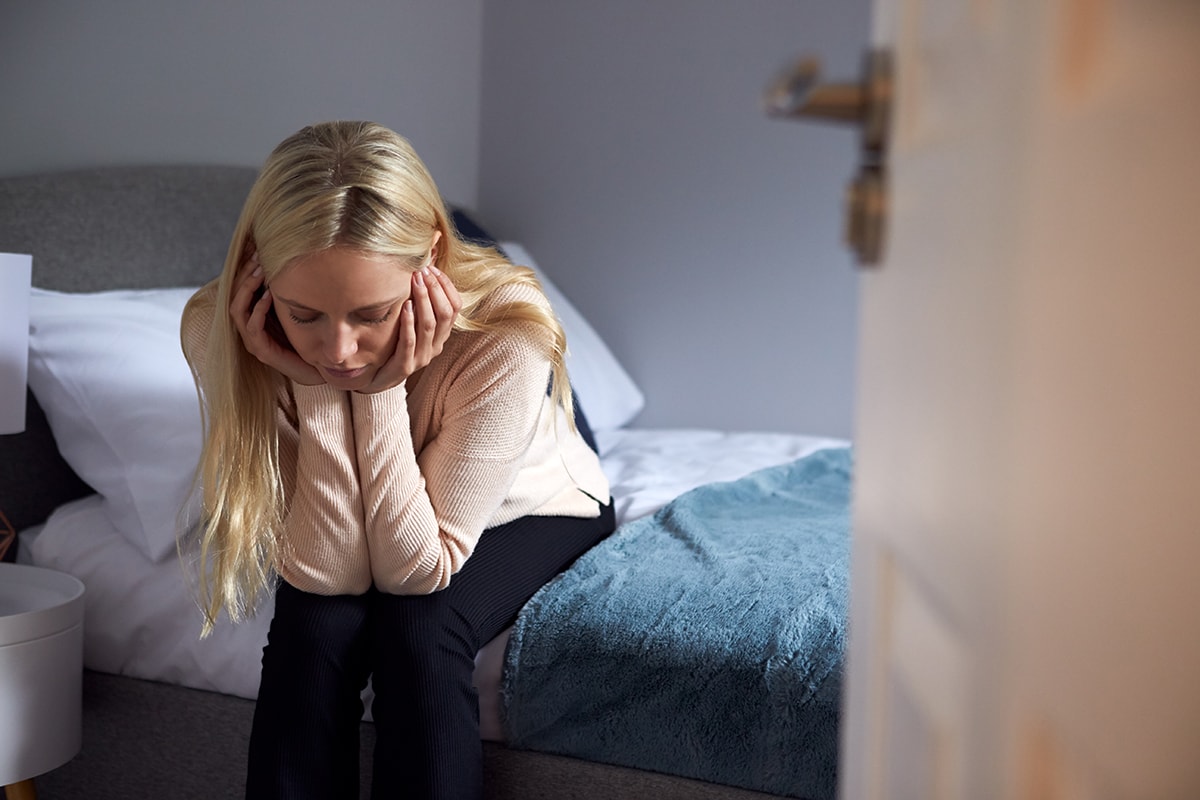
Skin Rashes Cause Trauma
The truth is that living with skin rashes, no matter your diagnosis, is incredibly traumatic.
They cause you to lose your sense of self confidence as well as your self worth.
You can feel incredibly out-of-control because no matter what you do, flares pop up without explanation. No matter how good your routine is, your skin can go nuts at what’s usually the most inconvenient time.
In those moments of desperation and devastation, it is normal to feel a sense of growing anxiety, depression, and even thoughts of suicide as the state of living with rashes drags on and on and on.
One of the main reasons that you start to feel this sense of hopelessness has to do with such a significant drop in your quality of life.
Research looking at the quality of life factor confirms that this isn’t something in your head. Reasons that have been cited include a drop in productivity, loss of your social life and personal relationships, missing work, having to go to more doctors appointments, and pay more out-of-pocket expenses compared to someone who does not have these skin rash issues.
It's no surprise that after a while you just feel beaten down from pretty much everything that has to do with your skin.
Even children who are affected by these skin rash conditions find that they can end up the victims of bullying in school. Research shows us that they can end up doing worse in terms of their academics compared to their peers who do not have skin issues like eczema.
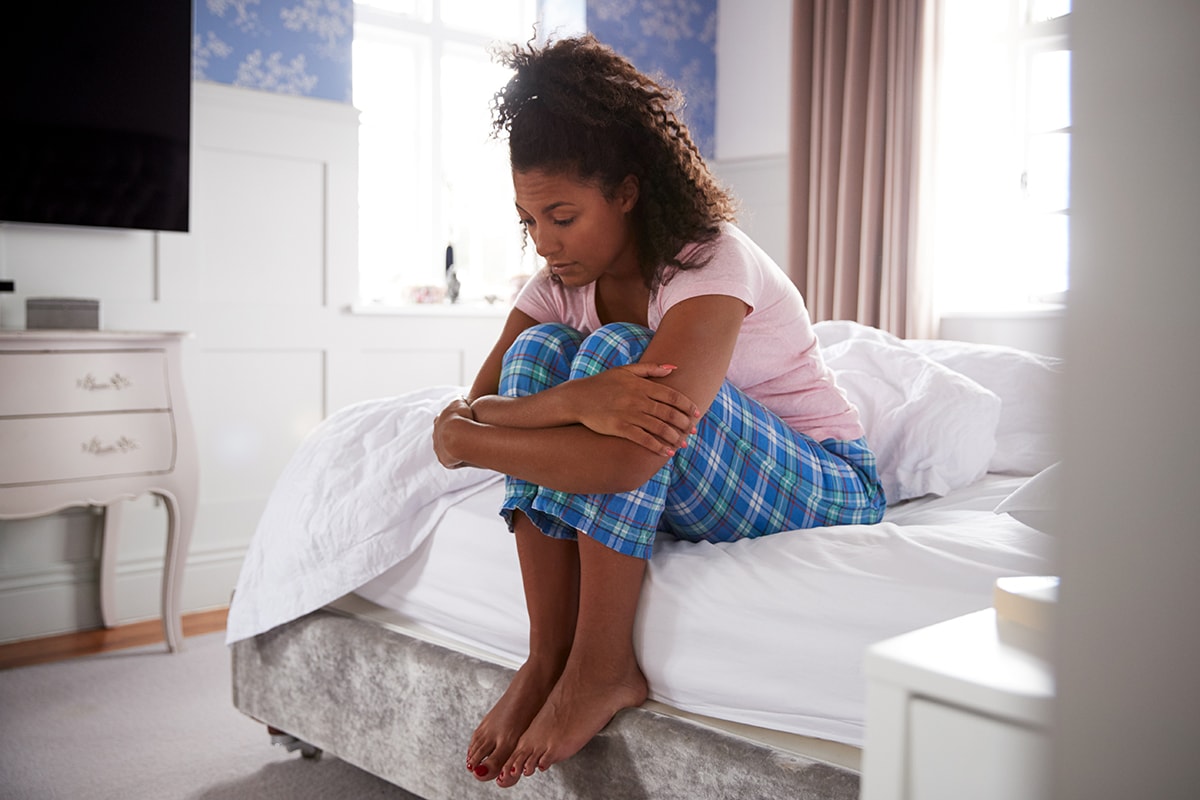
Risk Of Suicide From Skin Rashes
But what's most disturbing to me, even outside of the loss in quality of life is the risk of suicide that comes along with these conditions.
In a JAMA dermatology study, the researchers reviewed 15 previous studies that included more than 300,000 patients which had eczema. What they discovered was so sad and I wish that more people would talk about this.
Of those in this study, eczema sufferers were 44% more likely to have suicidal thoughts and they were 36% more likely to attempt suicide compared with those who did not have the disease.
Another study that I looked at in the Journal of American Academy of Dermatology reviewed those with psoriasis. What they discovered was that there is a 20% increased risk of “suicide ideation, suicidal behaviors, attempts of suicide as well as completed suicides”.
They also noted that the tendency was increased in younger populations (ie. 20-something individuals compared to those who are in their sixties).
If this information is resonating with you and you have considered suicide or you’re at a point that feels incredibly dark, please get help.
There is the National Suicide Prevention line in the United States that you can call and speak with someone anonymously. Their number is (800) 273-8255.
Your life is incredibly important. While things may feel dark and difficult right now, it may not always be that way.
It is imperative that you reach out to someone even if you don't feel that you can go to your friends and your family or your spouse.
Reach out to someone to get the help and support that you need.
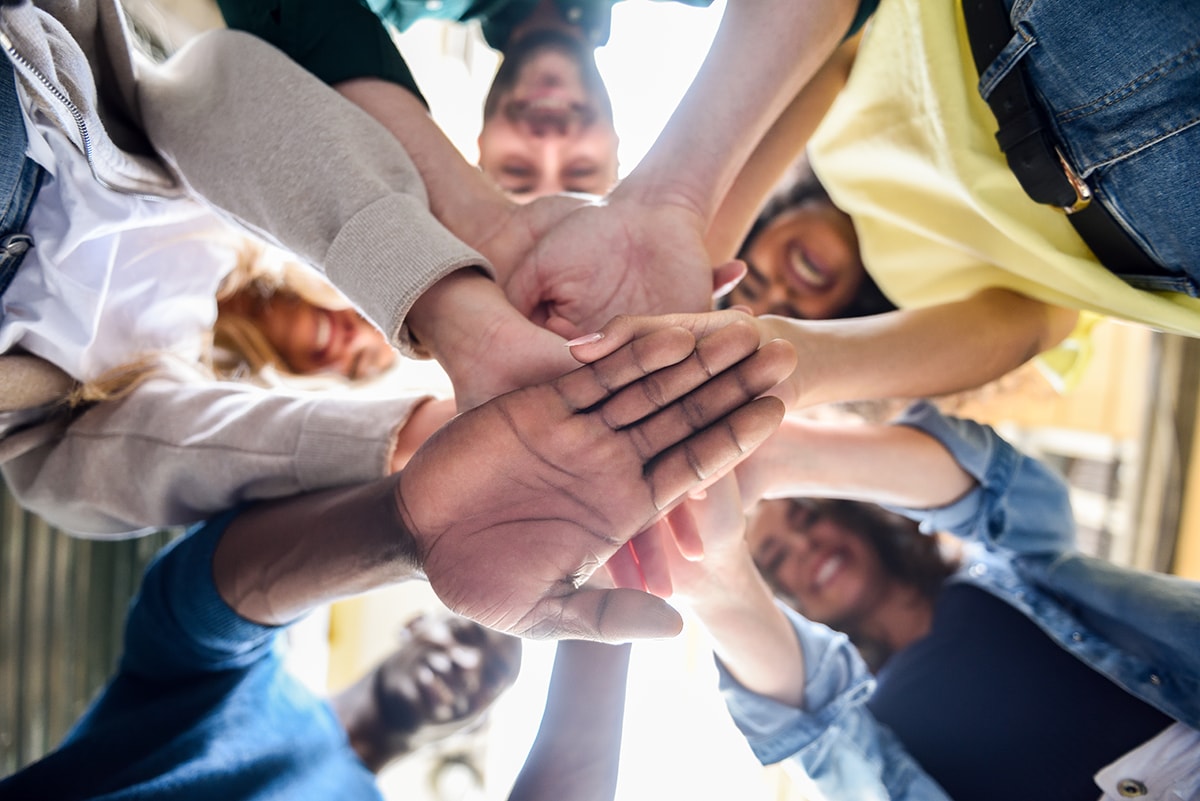
Giving You Tools To Cope (And Even Thrive)
Because I work directly with people who have these chronic skin rashes and I’ve experienced it myself, I know first hand how valuable your life is.
It's one of the reasons why I started the Healthy Skin Show. I wanted to give you an alternative perspective on the way that we are currently approach and deal with all of these different rashes — eczema, psoriasis, rosacea, hives, etc.
But I also want to give you the tools that you need in order to process the mental and emotional baggage that comes along with these issues.
While I personally am not qualified to walk you through them, I love connecting you with guests on the show who are. That way we can have conversations about a facet of these diseases that is uncomfortable.
Even though every day living with skin rashes is traumatic, getting to the other side where your skin finally heals doesn't necessarily mean that all of the insecurities magically disappear.
It's actually more common than you would think to continue to experience these uncomfortable emotions even though your skin looks healthy.
One reason is that you've spent so long in a negative traumatic pattern that you no longer know how to become that happier, more joyful version of yourself.
That's why it's imperative that you begin to do this work on the mental and emotional sides of yourself now.
Even though you haven't gotten to the goal, it’s best to start working on this so that no matter where you are along your journey, you can embrace the inner you.
So what can you do right now?
The first thing to do is talk to someone. Ideally this person is professionally qualified to help you confront and process the traumas and emotions that come from living every single day of your life with skin rashes.
Second, check out the following episodes that I've already recorded here at the Healthy Skin Show that address these specific concerns.
Some episodes I’d encourage you to listen to include:
- Is Trauma A Root Cause For Your Skin Rashes?
- How To Thrive Emotionally Living With Chronic Skin Rashes
- Navigating The Shame Response
- How To Deal With The Shame & Sadness Of Skin Rashes
Third, begin to think about your greater “why”.
Why are you here?
What is your purpose?
When you connect with your purpose, so much is possible. You can find hope, resiliency and persistence even when things feel so dire and so dark.
And one final note, no matter where you are on your journey, know that…
I see you. I hear you. And I'm with you every step of the way.
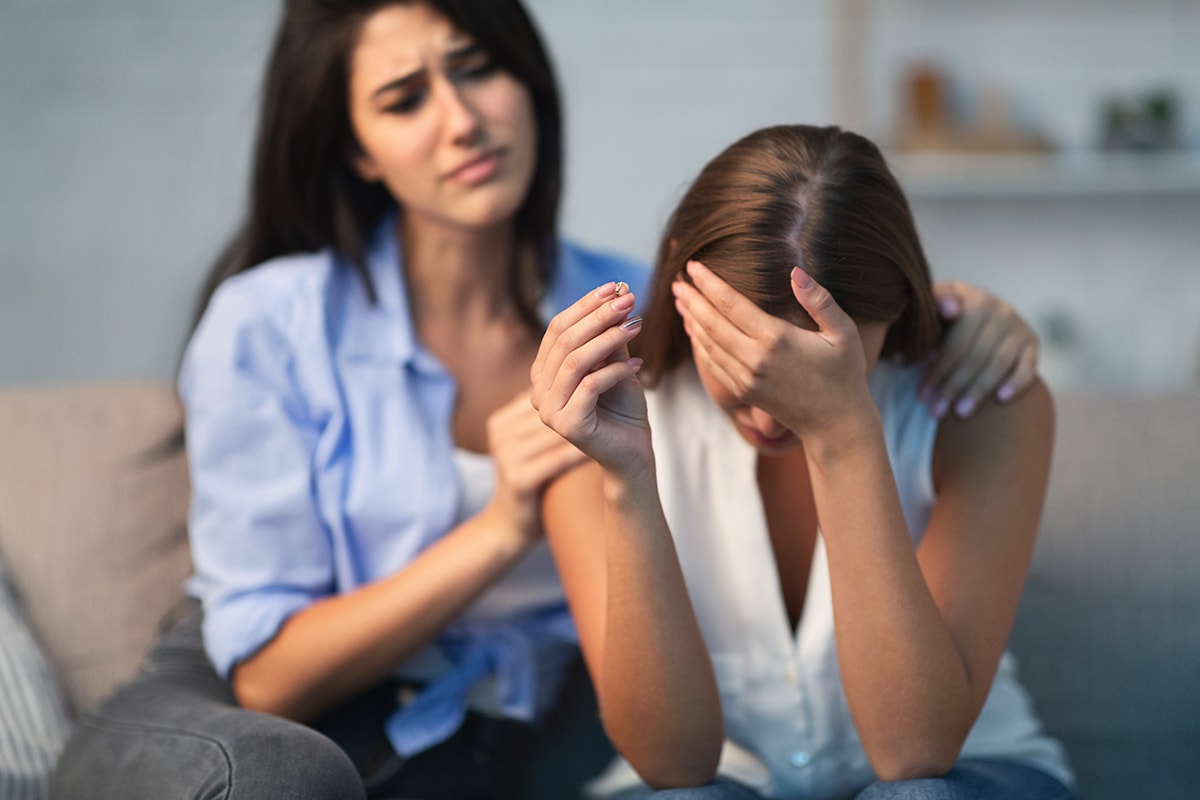
We Need More Awareness To Help Those In Crisis
As a community we need to do better.
We need to do more to help those who are in those moments of dark crisis.
I hope that this episode will be a reminder to check-in with your fellow skin rash warriors who may have days where they feel incredibly alone. They need to know that someone else sees them, hears them and is with them.
Leave your questions, comments, and even your own experiences below so that we can keep this very important conversation going.
And I challenge you to share this episode. Share it with people that you've never shared it before. Share it in Facebook groups and on Instagram.
Talk about this information wherever you can.
I challenge you because people aren't talking about this.
In January 2019, one of these studies was released. I saw a few headlines about it. It never really made major news and then it disappeared from the news cycle altogether.
We as a community need to advocate. We need to raise awareness about what is happening to those in our community who feel as if they are drowning.
Because one of the most disturbing things that I discovered looking into this research is that “two-thirds of patients with eczema who died from suicide had visited a physician in the month before their death.”
I know that's pretty heavy stuff to leave you with, but I think it underscores why I'm not just asking you to share this time around.
I'm challenging you to share this with every single person you know.
It's that important.
With all that said, I deeply appreciate you tuning in to the Healthy Skin Show.
If you haven't already, please subscribe to the podcast on your podcast platform of choice. Take a moment to rate and review the show so that someone else looking for that sense of hope and possibility can give us a chance.
Thank you so much for joining me and I look forward to seeing you in the next episode!

REFERENCES
https://bmjopen.bmj.com/content/8/11/e023776
https://www.ncbi.nlm.nih.gov/pmc/articles/PMC4192777/
https://www.health.com/eczema/living-with-severe-eczema
https://jamanetwork.com/journals/jamadermatology/article-abstract/2717582
https://nationaleczema.org/research/eczema-facts/
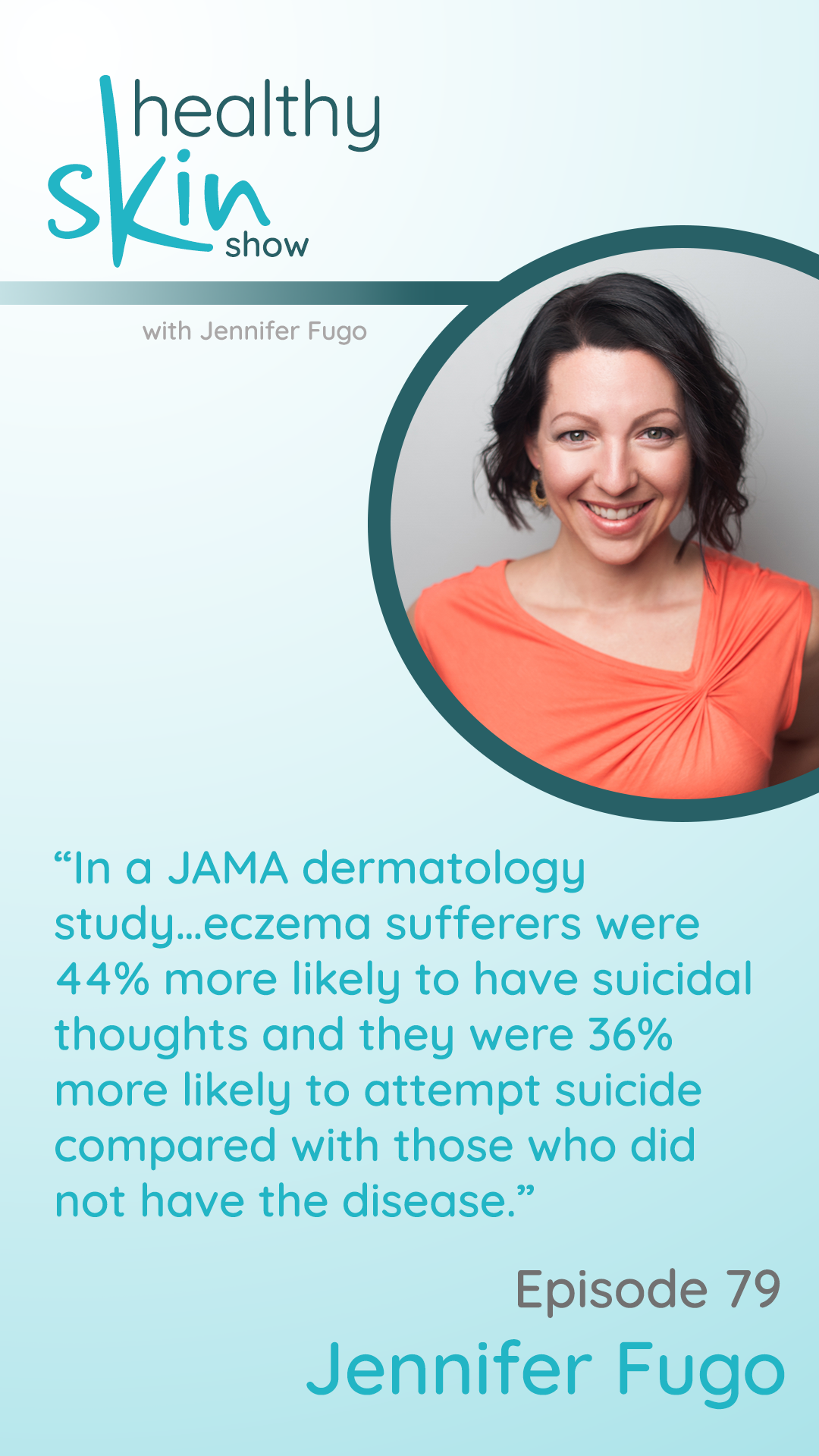
Jennifer Fugo, MS, CNS
Jennifer Fugo, MS, CNS is an integrative Clinical Nutritionist and the founder of Skinterrupt. She works with women who are fed up with chronic gut and skin rash issues discover the root causes and create a plan to get them back to a fuller, richer life.





Hi Jennifer. Thank you so much for this episode about suicide. I was recently diagnosed lichen sclerosus and actually think a rash on The back of my arms is actually related and possibly lichen Planus. I am 65 and year 3 into a wonderful relationship and very happy. Until 4 weeks ago. Now When I wake up itching my entire body, sex hurts and I am now desensitized due to fusion, can’t find a dr that specializes in this, or understands. I am having thoughts I don’t like for the first time in my life. I have been through tough times including the loss of a new born but this has affected every area of my life. So thank you! Keep up your good work.
Robin. My LS flared at age 29 or 30 years. I am 60 years now and was finally diagnosed less than a year ago. So I went untreated living in unbearable pain for more than 30 years. I am deformed, disabled, life and career ruined. I am filled with rage at the gross negligence I have encountered. Here in MN. The medical caoital of the world. What a fraud!
But you have a diagnosis and can get steroid treatment, so don’t give up. There are unproven treatments such as Mona Lisa and PRP or stem cell lifts that I am exploring right now. My diagnosis was after covid so I had to sit on burning fire of my body another year but I am still trying. If I can kerp trying so can you. I wish I knew one person that was for certain real that has this God and medical forsaken disease. It is incredibly isolating.
Hi Cathy, there are many people with LS that are struggling. If you’re on Facebook, there are several groups on there for LS warriors that you could join to help you feel less alone on this journey. I’ve also worked with clients dealing with this… it can be incredibly debilitating and, as you said, isolating for them until they find a group where there are others who understand what they’re going through.